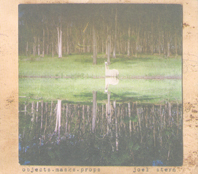: joel stern
Nature Strip, 2008, NS3006
www.naturestrip.com
Drawn together between 2000-2007 the list of sound sources and instruments on Joel Stern’s Objects, Masks, Props reads like the contents of an old bric-a-brac shop: “car radios, pipes…no-input mixer, ukulele, pocket trumpet…electronics…rusty gate, harmonica, rabid dogs…” And like a good bric-a-brac shop, while the mass of stuff may not initially appear orderly and logical, each element feels well-pondered and lovingly handled, resulting in the album offering plenitude without clutter.
The CD consists of eight relatively short tracks (with the exception of Throat Priest) each of which run straight on to the next, not with delicate cross fades but sudden jump cuts. Each track works towards but never quite reaches its ending, shifting us to a different atmospheric place every four minutes. However the overarching world we are in remains the same with every piece underscored by birds, insects and lo-fi static.
Ironically, while Stern’s sound for the audiovisual duo Abject Leader (with Sally Golding) is often non-narrative, this collection of purely sound pieces suggest far more filmic forays. Hints are provided in the titles but, within the soundscapes themselves, mini-dramas unfold. For example on “Concertina for Henri Mouhot”, a mournful wheezy concertina, accompanied by a percussive rainmaker, increases in intensity until the piece is swirling with stumbling notes and electronic bleeping to create a kind of malarial delirium. (The French Naturalist Mouhot died of malaria in the Laotian town of Luang Prabang where Stern collected some of his material.)
“The Dead Lakes” is the most filmic in style where squawking birds, heavy rain and increasingly terrifying, howling dogs are joined by a malevolent chant and subtle melodic underpinning to suggest a horror epic yet to be made. “Pheromone Wings”, meanwhile, is perhaps the strongest example of Stern’s heightened use of field recordings, as the buzzing of bees is effected with reverb and matched with drawn out notes from reed instruments, and orchestral samples creating an agitated symphony.
“Panda Box” is the noisiest track on the CD as rooster crows are mixed with tedious childlike tinkering with the bulbul tarang [an Indian banjo played with a keyboard]. This turns into a controlled cacophony strangely moving towards cohesiveness with the use of a radio sweeping through static-filled channels.
“Throat Piece” is the most spacious track running to almost nine minutes. Sharp bird twitter is accompanied by a beautiful bubbling flutelike sound—perhaps an effected bird call, or is it an instrument? This is quite rudely interfered with by glitchy radio static, and the two textures continue in parallel for several minutes until a murky channel is settled on and we hear the distant strains of a prayer song. Eventually a sample is introduced in which words are clearly discernible—“I wish I had gone with Elsa”, adding a curious text-driven denouement. While perhaps a little looser than other tracks on the album, it clearly illustrates Stern’s associative approach—both textually and content wise—to his sound materials.
The first and last tracks on Objects, Masks, Props are the most melodically pre-occupied. In the first track, “Stradbroke Verse”, flute-like tunes drift in and out of focus like mist floating through and prettying up a landscape. In the final track “Fortitudes End”, the melancholic accordion and guitar drive the ‘song’ accompanied by strident cicadas, wailing women and general gritty atmos, each element separate yet complimentary.
Objects, Masks, Props is perhaps most interesting because rather than the field recordings grounding us in the ‘real world’, serving as markers of concrete space, Stern’s manipulations and combinations create a kind of lucid-dreaming—a not unpleasant state to dwell in for the 40 minutes of this CD.
Gail Priest






